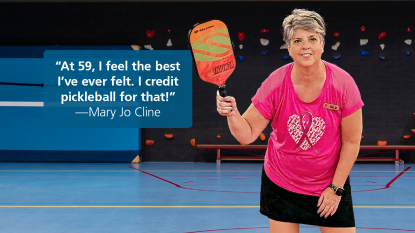Tired of Feeling Underestimated? Here Are 6 Tips for Restoring Confidence
Our expert panel weighs in on how to feel more confident.

Sometimes life’s happenings make us feel like we’re not appreciated. Almost 70 percent of women over the age of 50 say they have felt overlooked and undervalued. Fortunately, there are ways to restore your self-belief and become more empowered. Here’s how to feel more confident and back yourself.
Renew your perspective.
Know it’s really not you. “Women, especially those of us who are over a certain age and/or a person of color, are constantly being met with messages that we don’t belong,” says expert Oludara Adeeyo. “But it’s helpful to understand others are often reacting to what’s going on in themselves, projecting their own beliefs onto us.” Remembering this doesn’t excuse them, but it gives us the distance needed to stop blaming ourselves for their issues.
Challenge beliefs. “When we deal with bias, it’s easy to start thinking we’re not good enough or that our age or body type makes us less worthy,” says Adeeyo. “But you can unlearn these internalized beliefs.” She does just that with a simple affirmation that empowers you to think differently about yourself. “My favorite is: ‘I have the right to be compassionate with myself.’” Framing self-kindness as a right is key to boosting self-esteem.
Find strength in the past. When you have an intense reaction to someone underestimating you, ask yourself if something from your past is triggering you, urges Suzanne Degges-White, PhD. “If someone assumes you can’t handle money, for example, it may make you angrier because a math teacher treated you like you couldn’t succeed when you were a kid,” she says. “Just tell yourself, ‘That was then; this is now,’ and look back on all your successes: ‘I did X and Y, and I am capable.’”
Be your best advocate.
Show your big heart. Often, the best way to stand up for yourself is to flex your empathy. “If, say, the cashier ignores you when you ask her to pack your groceries in a certain way, try to put yourself in her shoes,” suggests Degges-White. “You might tell yourself that she’s lost in her thoughts or it’s a tough job — it’s not about you.” Extending compassion lets you calmly respond: “Let me put the eggs on top so they don’t get crushed.” Depersonalizing the situation puts you in control.
Ask a few questions. Sometimes folks don’t even realize they’re overlooking us—this happens more as we get older, says expert Jeanette Leardi. “Just name the behavior, ask why and correct it,” she advises. “For example, if your doctor isn’t listening, ask why he’s disregarding your concerns.” Then tell him how you’d like to be treated: “I’d love for you to tell me more about this new treatment.” Just calling out behavior helps you get on the same page.
Keep focused on goals. In the end, the last person who should underestimate you is you. “Finding little things to accomplish — from volunteering to attending an exercise class once a week — reminds you just how many strengths you have,” says Adeeyo. “Moving through the world honestly, by recognizing what you’re capable of and what you can still work on, is the best way to live up to your true potential.”
Our Expert Panel
Oludara Adeeyo, author of Self-Care for Black Women, is a psychotherapist who is determined to help people, especially Black women, improve their well-being.
Suzanne Degges-White, PhD, is a professor and chair of the Department of Counseling and Higher Education at Northern Illinois University.
Jeanette Leardi is a social gerontologist, community educator, and aging wellness leader who has a passion for older adult empowerment.
A version of this article originally appeared in our print magazine, Woman’s World.













